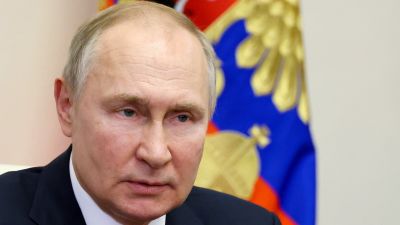Insight
Is Vladimir Putin ill and what would the impact be on the war in Ukraine if he is?

ITV News' Emma Burrows explores the speculation surrounding the Russian leaders' health and assesses what impact any illness he may be suffering could have on the war in Ukraine
Is Vladimir Putin unwell? Does he have Parkinson's? Cancer? A chronic illness? Does he use body doubles? Could he even be dead? As the war in Ukraine has progressed, more and more rumours have swirled about the state of Putin's health.
The world's media have poured over images of him broadcast on Russian state television, trying to guess whether a tapping foot or a hand gripping a table are a sign of illness.
Last summer, CIA Director William Burns joked Putin is "entirely too healthy".
Russian investigative websites have written about how Putin - in the pursuit of better health - enjoys bathing in baths of blood from deer antlers, supposedly said to improve blood flow.
They have also reported that he travels everywhere with a team of doctors, including a cancer specialist.
The Kremlin has been accused of - and not commented on - recording Putin's appearances in advance and storing them up to be released at a later date, to give the impression that he is working in public.
Wilder theories speculate that Putin may already be dead. Ukraine's President Volodymyr Zelenskyy seized on this recently and said he is "not sure whether the president of Russia is still alive."
Perhaps Zelenskyy is hoping Putin is dead because the war is Putin's idea: it is possible his death, or removal, might be so destabilising to Russia that the Kremlin would not be able to focus all its efforts on the war in Ukraine. Still, I have spoken to Russians who genuinely believe that their president has died and that a body double (or two) have taken his place.
All this speculation about the state of Putin's health does not tell us much. But it does tell us one thing - how little we know.
Want a quick and expert briefing on the biggest news stories? Listen to our latest podcasts to find out What You Need To Know
In the United Kingdom, the public knew when then-prime minister Boris Johnson was hospitalised with coronavirus.
In the United States, the White House announced when then-president Trump and current president Joe Biden fell ill. In Russia, there is just rumour and mystery.
We do know, however, that Putin's concerns about his health have apparently increased since the coronavirus pandemic.
I have seen Putin in person multiple times and have spoken to him once. I have sat in some-smaller, some-bigger rooms with him - sometimes packed with journalists or businesspeople.
Prime territory for the spread of an infection.
During the pandemic, it was rumoured that anyone who went to visit Putin had to quarantine for two weeks. It is still thought that anyone who goes near him must take a Covid test.
Nowadays, Putin's public appearances broadcast on Russian state television seem largely confined to addressing officials via video-link or from the end of an almost impossibly long table.
When he visits factories or interacts with the public, it is normally in a large room, at a distance.
Putin is depicted on Russian state television as a man who is in control, if increasingly at a distance, from Russian society.
When I asked Putin's spokesperson Dmitry Peskov recently if the Kremlin was preparing for his re-election campaign in 2024, he told me it is "not an issue which is on our agenda."
"Of course, we are all thinking about the future. But this is not an urgent issue right now. We are preoccupied with different things," Peskov told me.
One issue the Kremlin is obviously concerned about is the war in Ukraine. Another is maintaining stability in Russia at a time of great upheaval: in the last year Russia has been slammed with western sanctions and Putin has mobilised his population to fight in his war.
But one reason the Kremlin might not view the election as an "urgent" priority is because it sees Putin's re-appointment as a foregone conclusion.
While some analysts believe that launching the war in Ukraine has destabilised Russia - which ultimately might lead to Putin's exit from power - they also agree that, right now, there is no serious challenge to him.
The Kremlin depicts Putin as a strongman; defending Russia's interests against the destructive west.
Because Russia's power system is top-down, this image, broadcast to millions of Russians across state media, relies on Putin being perceived as strong - politically, mentally and physically. If Putin's health is seriously questioned, it is a real threat to his power.
True power in Russia is concentrated in the hands of a handful of people who control everything about Vladimir Putin's health and image.
The speculation about Putin's health shows us how closed a society Russia has become. It may point to Putin's own paranoia about disease or indicate how terrified the Kremlin is of losing control.
It does not, however, tell us - the people outside Vladimir Putin's tiny, closed, inner circle - anything, really, about whether he is ill or not.
Russians have as much of an idea about the health of their president as people outside the country. And the reality is, we know very little at all.
It was one of the biggest news stories of our time - and it's still not over. So what did Boris Johnson know about Downing Street’s notorious parties? With fresh revelations from our Number 10 sources, in their own words, listen to the inside story...